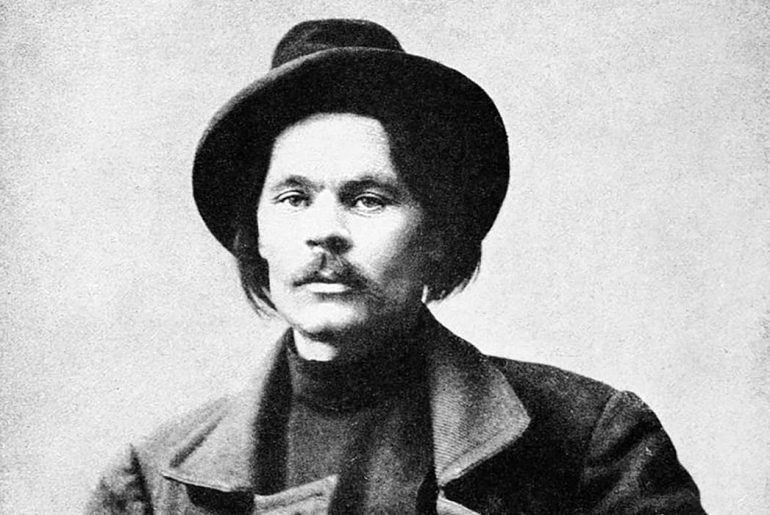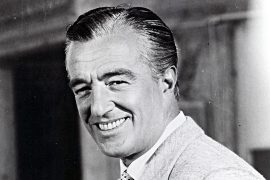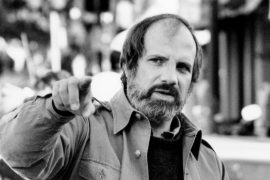The Russian writer is the main representative of socialist realism. Maxim Gorky himself proclaimed this art form at the Congress of the Soviet Union of Writers. His early literary work is influenced by Russian Romanticism. He then turned to realistic storytelling, which helped him to succeed from the start. In the years from 1906 to 1911 Maxim Gorky politicized his works. In it he turned against the petty bourgeoisie. In addition to novels, Gorki also wrote literary and culturally critical essays…
Maxim Gorky was born the son of a carpenter in Nsini Novgorod on March 28, 1868.
His real name is Alexei Maximowitsch Peschkow. Maxim Gorki lost his father when he was only five years old in 1873. He spent his childhood and youth with his grandfather. In the years 1877-1879 he attended a school. Then, with the death of his mother in 1879, according to his grandfather’s will, he had to earn his own living. Over the next few years, Gorki held various jobs, such as baker, errand boy, dock worker and dishwasher.
In 1884 he moved to Kazan with the plan to study at the university. But he abandoned this plan. Gorky made contact with a group of Marxists. In 1888 he was accused of political activity and arrested. There followed constant observations by the police. In the two years 1891 and 1892 he went looking for work and wandered through the Volga region, the Ukraine, the Crimea and the Caucasus. In 1892 his first story “Makar Tschudra” was published under the stage name “Gorki”, which means something like “the bitter one”.
In the years from 1894 to 1901 further stories like “Tschelka” (1894) followed. They are written in the style of Russian Romanticism, despite its “Gorki” label. Tramps and adventurers are mostly the heroes in these works. This made Maxim Gorki one of the first writers in Russia to address the disadvantaged, the proletariat. In 1899 the writer moved to Petersburg. He made close acquaintances with members of revolutionary circles and sided with the Russian Social Democratic Labor Party (RSDRP).
Between 1899 and 1900 he met the writers Anton Chekhov and Leo Tolstoy, with whom he became friends. In 1900 he founded the publishing house “Wissen” and became its director. In 1901 his revolutionary poetry work “The Song of the Storm Bird” was published in the Marxist magazine “Leben”. As a result, Gorky was arrested again. In 1902 his first drama entitled “Kleinbourger” came onto the market. The dramatic work “Nachtasyl” followed, which became a worldwide success. “Nachtasyl” was performed in the year of its publication at the Moscow Art Theater and a year later at the Small Theater of Max Reinhardt.
During the period of protest against the government of the Russian tsar, Maxim Gorki made social conditions the subject of his dramas. The writer found sufficient material in the Russian Revolution to determine the literary plots of his works. In 1902 he was admitted to the Russian Academy of Sciences, but a year later the admission was revoked for political reasons. In 1905 Gorky made the acquaintance of Vladimir Ilyich Lenin, which then became a friendship. In the same year he took part in the protest actions and was arrested again.
Under pressure from the world public, he was released again. In 1906 he undertook a trip to the USA on behalf of the party with the purpose of providing material and political support for the revolution. It was there that the narrative work “Mother”, a novel about the proletariat, was written. Gorky processed his travel experiences in the title “The City of the Devil”. In the years 1906 to 1913 he had to go into exile on Capri. After that he returned to Russia. Between 1913 and 1923 he published his autobiographical trilogy “Childhood”, “Among Strangers” and “My Universities”. Maxim Gorky spoke out against Russian interference in World War I.
He rejected the assumption of power by the Bolsheviks in November 1917. Gorky publicly criticized Lenin’s widespread acts of terror and persecution. Censorship introduced in 1918 silenced him. In 1919, Maxim Gorky took part in the creation of the Leningrad Gorky Theater. In 1921 the poet went into exile a second time in Sorrento. The novel “The Work of Artamonov” was written in 1925 and, like many other works, deals with the fragility of Russian society. In 1931 he returned to Russia. Due to disagreements with Josef V. Stalin, the writer was forbidden to leave Russia.
In 1934 Gorky became the first chairman of the Russian Writers’ Union. He called for a literature in the spirit of socialist realism. He himself wrote his works in this style and is considered its most important representative with a strong role model character.
Maxim Gorky died in Moscow on June 18, 1936 under mysterious circumstances. These circumstances have not been clarified to this day. The suspicion is still being voiced that the writer was murdered by the Russian secret service.
What was Maxim Gorky famous for?
Gorky’s most famous works are his early short stories, written in the 1890s (“Chelkash”, “Old Izergil”, and “Twenty-Six Men and a Girl”); plays The Philistines (1901), The Lower Depths (1902) and Children of the Sun (1905); a poem, “The Song of the Stormy Petrel” (1901); his autobiographical trilogy, My Childhood.
How was Maxim Gorky involved in the Russian revolution?
He opposed the Bolshevik seizure of power during the Russian Revolution of 1917 and went on to attack the victorious Lenin’s dictatorial methods in his newspaper Novaya zhizn (“New Life”) until July 1918, when his protests were silenced by censorship on Lenin’s orders.
What is the meaning of Maxim Gorky?
Definitions of Maxim Gorki. Russian writer of plays and novels and short stories; noted for his depiction of social outcasts.
Why was Maxim Gorky exiled from Russia?
His efforts, however, were thwarted by figures such as Lenin and Grigory Zinovyev, a close ally of Lenin’s who was the head of the Petrograd Bolsheviks. In 1921 Lenin sent Gorky into exile under the pretext of Gorky’s needing specialized medical treatment abroad.





